Austrian actor Hans Holt (1909-2001) appeared in nearly 100 films in a career that stretched back to 1935. He portrayed Baron Von Trapp in two German films from the 1950s, a role which Christopher Plummer later played in the musical The Sound of Music.
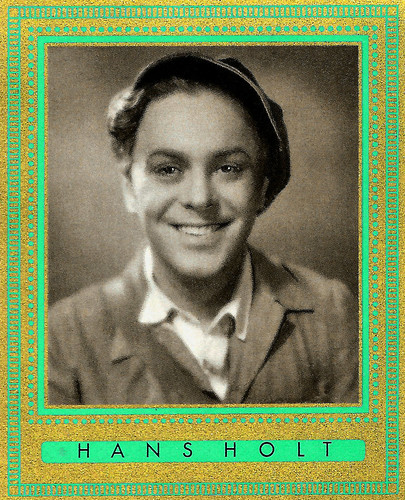
German collectors card in the Bunte Filmbilder series by Ross Verlag for Caid, Series no. 2, no. 491. Photo: Styria-Film. Hans Holt in Lumpacivagabundus/Lumpaci the Vagabond (Géza von Bolváry, 1936).
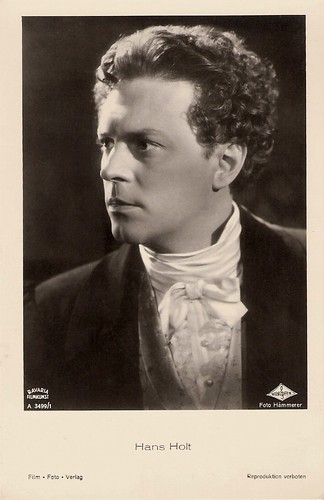
German postcard by Film-Foto-Verlag, no. A 3499/1, 1941-1944. Photo: Hämmerer / Wien-Film / Bavaria Filmkunst. Hans Holt in Brüderlein fein/Little brother fine (Hans Thimig, 1942).
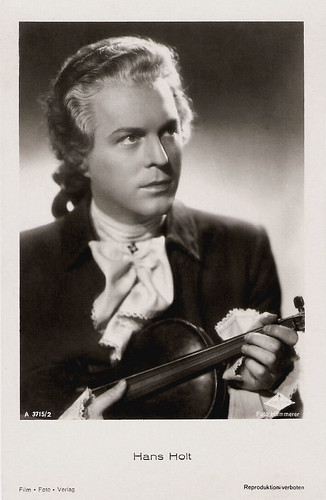
German postcard by Film-Foto-Verlag, no. A 3715/2, 1941-1944. Photo: Hämmerer / Wien-Film. Hans Holt as Wolfgang Amadeus Mozart in Wen die Götter lieben/The Life of Wolfgang Amadeus Mozart (Karl Hartl, 1942).

German postcard by Film-Foto-Verlag, no. G 222. Photo: Wesel / Berlin-Film. From Tatiana.
Hans Holt was born Karl Johann Hödl in Wien (Vienna), Austria-Hungary (now Austria) in 1909. He was the son of the glazier Karl Hödl and his wife Paula Hödl-Schmider. He visited the Bundesrealschule am Donaukanal and graduated from the Akademie für Musik und Darstellende Kunst Wien (the Academy of Music and Performing Arts in Vienna).
In 1930, he made his debut at the Volkstheater, and later during his career he played at the Vienna Burgtheater, and in theatres in Zurich and Berlin. For more than forty years, he was a member of the Theater in der Josefstadt in Vienna.
A few years after his stage debut he was discovered for the cinema and appeared in the short Fasching in Wien/Carnival in Vienna (1935) with Leo Slezak. Soon followed a bigger role in Henry Koster's Katharina, die Letzte/Catherine the Last (Hermann Kosterlitz aka Henry Koster, 1936) with Franciska Gaal. His type of role was that of the handsome young man who conquered the female audience with his sympathetic good nature.
His best-known films from this period include Konfetti/Confetti (Hubert Marischka, 1936), Lumpacivagabundus/Lumpaci the Vagabond (Géza von Bolváry, 1936) with Heinz Rühmann, Finale/The Restless Girls (Géza von Bolváry, 1938) with Käthe von Nagy, Das Ekel/The Grouch (Hans Deppe, 1939) starring Hans Moser, and Unsterblicher Walzer/Immortal Waltz (E.W. Emo, 1939) as Josef the brother of waltz king Joseph Strauss (Paul Hörbiger).
Till the end of the war followed more popular entertainment films like Der Postmeister/The Stationmaster (Gustav Ucicky, 1940) starring Heinrich George, Rosen in Tirol/Roses in Tyrol (Géza von Bolváry, 1940) an operetta adaptation of Carl Zeller's Der Vogelhändler (The Bird Seller), Schrammeln (Géza von Bolváry, 1944) opposite Marte Harell, and Geld ins Haus/Money into the house (Robert A. Stemmle, 1945-1947). He also starred as Wolfgang Amadeus Mozart in the biopic Wen die Götter lieben/Whom the Gods Love (Karl Hartl, 1942).

German postcard by Ross Verlag, no. A 2021/1, 1941-1944. Photo: Cine-Allianz.

German postcard by Ross Verlag, no. A 2563/1, 1939-1940. Photo: Cine-Allianz.
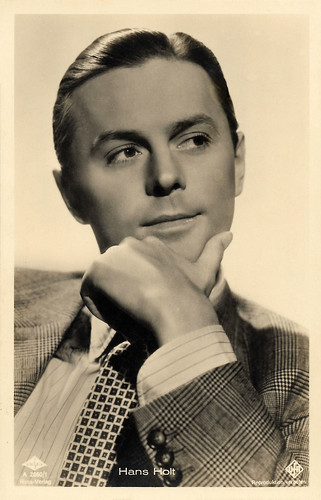
German postcard by Ross Verlag, no. A 2860/1, 1941-1944. Photo: Wien-Film / Ufa.
At the side of such Austrian stars as Paula Wessely, her husband Attila Hörbiger, his brother Paul Hörbiger, and Hans Moser, Hans Holt played in a total of more than eighty Heimat films and comedies. Even when he was over forty years old, he still often played the young man in love. His post-war films include the cheerful comedy of errors Königin einer Nacht/Queen of a Night (Kurt Hoffmann, 1951).
His most famous role was Baron von Trapp in the Heimat film Die Trapp-Familie/The Trapp Family (Wolfgang Liebeneiner, 1956) and the sequel Die Trapp-Familie in Amerika/The Trapp Family in America (Wolfgang Liebeneiner, 1958), both opposite Ruth Leuwerik. The melodramas about the impoverished but honest and brave Baron and his singing children in Salzburg were based on a true story. It was later reworked and remade as the classic musical The Sound of Music (Robert Wise, 1965).
And so the now grey-haired Hans Holt managed the transition into father and husband roles. In addition to his film work, he also appeared in plays by Hugo von Hofmannsthal, Luigi Pirandello, Arthur Schnitzler and Ferenc Mólnar. He had great success in 1946 with the première of Carl Zuckmayer's 'Des Teufels General' (The Devil's General). Apart from the Theater in der Josefstadt, he made guest appearances at other venues. He also wrote several plays himself, including the comedy Der Herzspezialist (The Heart Specialist) (1956).
In later years he was mainly a television actor. In 1972 he was at the side of Marika Rokk in 13 episodes of the family series Die Schöngrubers/The Schöngrubers (Klaus Überall, 1972). In the early 1980s, he played in the TV series Ich heirate eine Familie/I Marry a Family (1983-1985) with Peter Weck. From 1985 to 1989 he worked as Franz at the side of Alfred Boehm in the series Der Leihopa/The Borrowgranddad (Otto Anton Eder, 1985-1988). Among his peculiarities was a muted and slightly nasal soft tone. In his early film roles, he often did singing performances.
Since 1936, Hans Holt had been married to the former script girl Renate Bremer. Their only daughter died in 1945 at the age of two years. In 1966 he received the Josef Kainz Medal for the role of George in 'Who's Afraid of Virginia Woolf', and in 1987, he was awarded with the Filmband in Gold for his long and outstanding achievements in German film. His last films Included Der Bockerer/Bockerer (Franz Antel, 1981) and Der Bierkönig/The Beer King (Tom Toelle, 1990). Hans Holt passed away after a long illness in 2001 in Baden-Baden, Austria. He was 92.
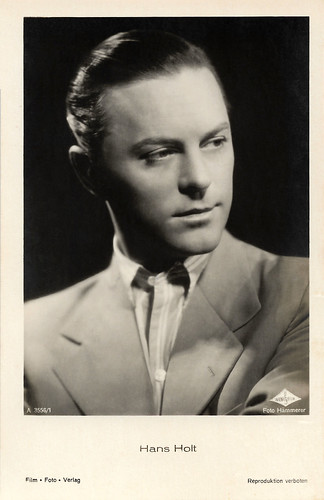
German postcard by Film-Foto-Verlag, no. A 3558/1, 1941-1944. Photo: Hämmerer / Wien-Film.

German postcard by Film-Foto-Verlag, no. A 3715/1, 1941-1944. Photo: Wesel / Berlin-Film.

German postcard by Rüdel-Verlag, Hamburg-Bergedorf, no. 862. Photo: Gundlach / OSKA / Unionfilm. Hans Holt in Liebe und Trompetenblasen/Love and Trumpets (Helmut Weiss, 1954).
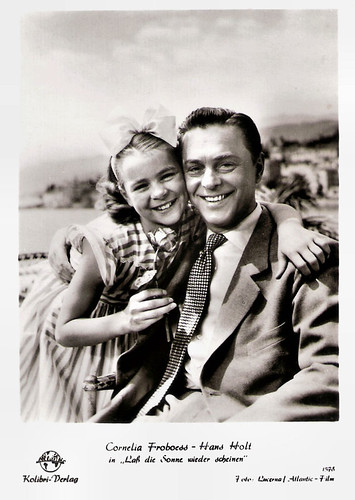
German postcard by Kolibri-Verlag, no. 1578. Photo: Lucerna / Atlantic-Film. Conny Froboess and Hans Holt in Lass die Sonne Wieder Scheinen/Let the Sun Shine (Hubert Marischka, 1955).
Sources: Stephanie D’heil (Steffi-line - German), Thomas Staedeli (Cyranos), Rusty White (Rusty White's Film World), Wikipedia (German) and IMDb.
This post was last updated on 16 October 2024.

German collectors card in the Bunte Filmbilder series by Ross Verlag for Caid, Series no. 2, no. 491. Photo: Styria-Film. Hans Holt in Lumpacivagabundus/Lumpaci the Vagabond (Géza von Bolváry, 1936).

German postcard by Film-Foto-Verlag, no. A 3499/1, 1941-1944. Photo: Hämmerer / Wien-Film / Bavaria Filmkunst. Hans Holt in Brüderlein fein/Little brother fine (Hans Thimig, 1942).

German postcard by Film-Foto-Verlag, no. A 3715/2, 1941-1944. Photo: Hämmerer / Wien-Film. Hans Holt as Wolfgang Amadeus Mozart in Wen die Götter lieben/The Life of Wolfgang Amadeus Mozart (Karl Hartl, 1942).

German postcard by Film-Foto-Verlag, no. G 222. Photo: Wesel / Berlin-Film. From Tatiana.
Sympathetic good nature
Hans Holt was born Karl Johann Hödl in Wien (Vienna), Austria-Hungary (now Austria) in 1909. He was the son of the glazier Karl Hödl and his wife Paula Hödl-Schmider. He visited the Bundesrealschule am Donaukanal and graduated from the Akademie für Musik und Darstellende Kunst Wien (the Academy of Music and Performing Arts in Vienna).
In 1930, he made his debut at the Volkstheater, and later during his career he played at the Vienna Burgtheater, and in theatres in Zurich and Berlin. For more than forty years, he was a member of the Theater in der Josefstadt in Vienna.
A few years after his stage debut he was discovered for the cinema and appeared in the short Fasching in Wien/Carnival in Vienna (1935) with Leo Slezak. Soon followed a bigger role in Henry Koster's Katharina, die Letzte/Catherine the Last (Hermann Kosterlitz aka Henry Koster, 1936) with Franciska Gaal. His type of role was that of the handsome young man who conquered the female audience with his sympathetic good nature.
His best-known films from this period include Konfetti/Confetti (Hubert Marischka, 1936), Lumpacivagabundus/Lumpaci the Vagabond (Géza von Bolváry, 1936) with Heinz Rühmann, Finale/The Restless Girls (Géza von Bolváry, 1938) with Käthe von Nagy, Das Ekel/The Grouch (Hans Deppe, 1939) starring Hans Moser, and Unsterblicher Walzer/Immortal Waltz (E.W. Emo, 1939) as Josef the brother of waltz king Joseph Strauss (Paul Hörbiger).
Till the end of the war followed more popular entertainment films like Der Postmeister/The Stationmaster (Gustav Ucicky, 1940) starring Heinrich George, Rosen in Tirol/Roses in Tyrol (Géza von Bolváry, 1940) an operetta adaptation of Carl Zeller's Der Vogelhändler (The Bird Seller), Schrammeln (Géza von Bolváry, 1944) opposite Marte Harell, and Geld ins Haus/Money into the house (Robert A. Stemmle, 1945-1947). He also starred as Wolfgang Amadeus Mozart in the biopic Wen die Götter lieben/Whom the Gods Love (Karl Hartl, 1942).

German postcard by Ross Verlag, no. A 2021/1, 1941-1944. Photo: Cine-Allianz.

German postcard by Ross Verlag, no. A 2563/1, 1939-1940. Photo: Cine-Allianz.

German postcard by Ross Verlag, no. A 2860/1, 1941-1944. Photo: Wien-Film / Ufa.
Baron von Trapp
At the side of such Austrian stars as Paula Wessely, her husband Attila Hörbiger, his brother Paul Hörbiger, and Hans Moser, Hans Holt played in a total of more than eighty Heimat films and comedies. Even when he was over forty years old, he still often played the young man in love. His post-war films include the cheerful comedy of errors Königin einer Nacht/Queen of a Night (Kurt Hoffmann, 1951).
His most famous role was Baron von Trapp in the Heimat film Die Trapp-Familie/The Trapp Family (Wolfgang Liebeneiner, 1956) and the sequel Die Trapp-Familie in Amerika/The Trapp Family in America (Wolfgang Liebeneiner, 1958), both opposite Ruth Leuwerik. The melodramas about the impoverished but honest and brave Baron and his singing children in Salzburg were based on a true story. It was later reworked and remade as the classic musical The Sound of Music (Robert Wise, 1965).
And so the now grey-haired Hans Holt managed the transition into father and husband roles. In addition to his film work, he also appeared in plays by Hugo von Hofmannsthal, Luigi Pirandello, Arthur Schnitzler and Ferenc Mólnar. He had great success in 1946 with the première of Carl Zuckmayer's 'Des Teufels General' (The Devil's General). Apart from the Theater in der Josefstadt, he made guest appearances at other venues. He also wrote several plays himself, including the comedy Der Herzspezialist (The Heart Specialist) (1956).
In later years he was mainly a television actor. In 1972 he was at the side of Marika Rokk in 13 episodes of the family series Die Schöngrubers/The Schöngrubers (Klaus Überall, 1972). In the early 1980s, he played in the TV series Ich heirate eine Familie/I Marry a Family (1983-1985) with Peter Weck. From 1985 to 1989 he worked as Franz at the side of Alfred Boehm in the series Der Leihopa/The Borrowgranddad (Otto Anton Eder, 1985-1988). Among his peculiarities was a muted and slightly nasal soft tone. In his early film roles, he often did singing performances.
Since 1936, Hans Holt had been married to the former script girl Renate Bremer. Their only daughter died in 1945 at the age of two years. In 1966 he received the Josef Kainz Medal for the role of George in 'Who's Afraid of Virginia Woolf', and in 1987, he was awarded with the Filmband in Gold for his long and outstanding achievements in German film. His last films Included Der Bockerer/Bockerer (Franz Antel, 1981) and Der Bierkönig/The Beer King (Tom Toelle, 1990). Hans Holt passed away after a long illness in 2001 in Baden-Baden, Austria. He was 92.

German postcard by Film-Foto-Verlag, no. A 3558/1, 1941-1944. Photo: Hämmerer / Wien-Film.

German postcard by Film-Foto-Verlag, no. A 3715/1, 1941-1944. Photo: Wesel / Berlin-Film.

German postcard by Rüdel-Verlag, Hamburg-Bergedorf, no. 862. Photo: Gundlach / OSKA / Unionfilm. Hans Holt in Liebe und Trompetenblasen/Love and Trumpets (Helmut Weiss, 1954).

German postcard by Kolibri-Verlag, no. 1578. Photo: Lucerna / Atlantic-Film. Conny Froboess and Hans Holt in Lass die Sonne Wieder Scheinen/Let the Sun Shine (Hubert Marischka, 1955).
Sources: Stephanie D’heil (Steffi-line - German), Thomas Staedeli (Cyranos), Rusty White (Rusty White's Film World), Wikipedia (German) and IMDb.
This post was last updated on 16 October 2024.
2 comments:
Thank you for this article. Hans Holt wrote an autobiography, “jeder tag hat einem morgen.” I ordered a copy, though my understanding of German is rudimentary. I enjoyed The Von Trapp Family (1956), and I want to learn more about the actor’s career in Austria in the 1930s and 1940s.
Thanks. If you learn someting new, you're welcome to share it here.
Post a Comment